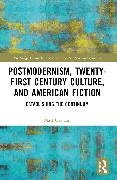Read more
Postmodernism's 'end' is a complex and contentious topic. Yet, one overarching consensus emerges: the postmodern has been surpassed. This book poses a thought experiment challenging this position - what if postmodernism persists within the twenty-first century?
Rather than designate a new epoch or coherent movement, this book interrogates the fragmented, contradictory, and counterintuitive endurance of postmodern aesthetics within post-Cold War America. An alternative use of postmodern aesthetics becomes possible when they are decoupled from their twentieth-century historical location. Collectively, these repetitions posit a postmodern continuum, contrasting the widely called-for succession of postmodernism via this decoupling. When postmodern aesthetics are no longer unconsciously repeated within their cultural moment, this emergent shift within a period 'after' postmodernism presents an alternative historical positioning and use. After their cultural vanguard, postmodern aesthetics become a confrontation of the chaotic realism of an inescapable post-Cold War capitalism, tapping into this cultural zeitgeist through literature.
List of contents
Acknowledgments
Introduction
1. Hallucinatory Reality, Unreliable Narration: From
American Psycho to Post-Truth America
2. Terroristic Nihilism in
Empire of the Senseless and
Fight Club: The Constructive Limits of Violence After the End of History
3. Revitalizing Transgressive Excess: Limitation, Waste & Reuse in
Love Creeps and
Sadie: The Sadist 4. Digital Regression: Mourning, Reuse & 'Bad' Reading in
God Jr. and
Zac's Control Panel 5. Contesting Categorization: Subjectivity, Race & Metafiction in
Percival Everett by Virgil Russell and
The Sympathizer 6. The Politics of Repetition: Nostalgia, Appropriation & Postmodern Aesthetics in
Taipei and
You Too Can Have a Body Like Mine Conclusion
Index
About the author
Matt Graham is a PhD graduate from Manchester Metropolitan University. His research interests include contemporary literature, American culture, experimental writing, the legacy of postmodernism, and both cultural and continental theory. He has taught narrative theory and American fiction at Manchester Metropolitan University and currently teaches academic skills as part of his Specialist Mentor role at Leeds Beckett University.

